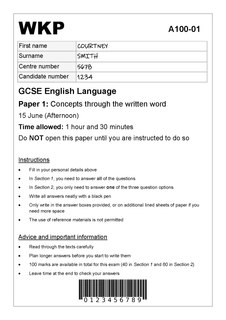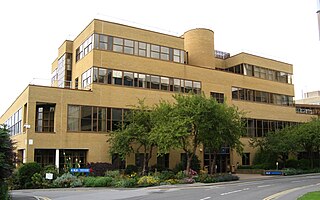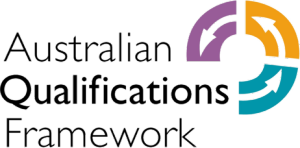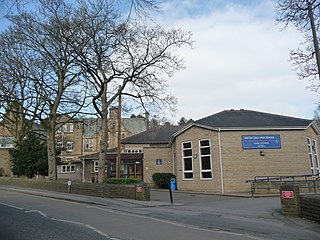Related Research Articles

The General Certificate of Secondary Education (GCSE) is an academic qualification in a particular subject, taken in England, Wales, and Northern Ireland. State schools in Scotland use the Scottish Qualifications Certificate instead. Private schools in Scotland may choose to use GCSEs from England.

AQA, formerly the Assessment and Qualifications Alliance, is an awarding body in England, Wales and Northern Ireland. It compiles specifications and holds examinations in various subjects at GCSE, AS and A Level and offers vocational qualifications. AQA is a registered charity and independent of the government. However, its qualifications and exam syllabi are regulated by the Government of the United Kingdom, which is the regulator for the public examinations system in England and Wales.
The Advanced Extension Awards are a type of school-leaving qualification in England, Wales and Northern Ireland, usually taken in the final year of schooling, and designed to allow students to "demonstrate their knowledge, understanding and skills to the full". Currently, it is only available for Mathematics and offered by the exam board Edexcel.
The European Baccalaureate is a bilingual educational diploma, which certifies the completion of secondary studies in a European School or Accredited European School by the Board of Governors of the intergovernmental organisation, "The European Schools". The diploma is awarded for the successful achievement of coursework and concomitant examinations which require that students take a minimum of 10 courses as well as be fully proficient in two languages. Students may take up to 14 courses. It is officially recognised as an entry qualification for Higher Education in all the member states of the European Union (EU), as well as in a number of others. All participating countries are legally obligated to ensure EB diploma holders enjoy the same rights and benefits as other holders of secondary school-leaving certificates in their jurisdictions. The name ‘European Baccalaureate’ belongs solely to the European Schools, which, since their establishment, have had a monopoly over its use in all the official languages of the EU.

The International General Certificate of Secondary Education (IGCSE) is an English language based examination similar to GCSE and is recognised in the United Kingdom as being equivalent to the GCSE for the purposes of recognising prior attainment. It was developed by University of Cambridge International Examinations. The examination boards Edexcel and Oxford AQA also offer their own versions of International GCSEs. Students normally begin studying the syllabus at the beginning of Year 10 and take the test at the end of Year 11. However, in some international schools, students can begin studying the syllabus at the beginning of Year 9 and take the test at the end of Year 10.
Further Mathematics is the title given to a number of advanced secondary mathematics courses. The term "Higher and Further Mathematics", and the term "Advanced Level Mathematics", may also refer to any of several advanced mathematics courses at many institutions.
Bishop Luffa School, named after a former Bishop of Chichester, Ralph de Luffa, is a co-educational Church of England secondary school located in Chichester West Sussex, England. The number of enrolled pupils was around 1,400 in 2010, in eight 'Year' house-forms and the sixth form. The school, formerly a 'Technology College', is now a 'CofE Teaching School', holding Leading Edge status, with national Artsmark and Sportsmark also having been awarded. From its foundation to 2013; a Voluntary Aided establishment, on 1 December 2013 the school successfully converted to Academy status.

The Australian Qualifications Framework (AQF) specifies the standards for educational qualifications in Australia. It is administered nationally by the Australian Government's Department of Industry, with oversight from the States and Territories, through the Standing Council of Tertiary Education Skills and Employment. While the AQF specifies the standards, education and training organisations are authorised by accrediting authorities to issue a qualification.
The International Baccalaureate Diploma Programme (IBDP) is a two-year educational programme primarily aimed at 16-to-19-year-olds in 140 countries around the world. The programme provides an internationally accepted qualification for entry into higher education and is recognized by many universities worldwide. It was developed in the early-to-mid-1960s in Geneva, Switzerland, by a group of international educators. After a six-year pilot programme that ended in 1975, a bilingual diploma was established.
The Group 5: Mathematics subjects of the IB Diploma Programme consist of two different mathematics courses, both of which can be taken at Standard Level (SL) or Higher Level (HL). To earn an IB Diploma, a candidate must take either Mathematics Applications and Interpretation (SL/HL) or Mathematics Analysis and Approaches (SL/HL).
The Welsh Baccalaureate, or Welsh Bacc, is an educational qualification delivered in secondary schools and colleges across Wales. The Welsh Government says that it gives broader experiences than traditional learning programmes, developing transferable skills useful for education and employment. The Welsh Bacc is offered at Advanced, National Foundation and National/Foundation level, and is studied alongside a range of academic and vocational qualifications.
The UCAS Tariff is used to allocate points to post-16 qualifications. Universities and colleges may use it when making offers to applicants. A points total is achieved by converting qualifications, such as A-Levels, into points, making it simpler for course providers to compare applicants. It is used as a means of giving students from the United Kingdom places at UK universities.

The A-Level is a subject-based qualification conferred as part of the General Certificate of Education, as well as a school leaving qualification offered by the educational bodies in the United Kingdom and the educational authorities of British Crown dependencies to students completing secondary or pre-university education. They were introduced in England and Wales in 1951 to replace the Higher School Certificate.

Skipton Girls' High School, founded in 1886 by the Petyt Trust, is an all-girls selective grammar school situated in Skipton, North Yorkshire, England. The school is a founding member of Northern Star Academies Trust and leads Northern Lights Teaching School Alliance and Northern Lights SCITT. Around 810 girls aged 11 to 18 are educated at the school, of which 240 are in the sixth form.
The General Certificate of Education (GCE) Advanced Level, or A Level, is a main school leaving qualification in England, Wales, Northern Ireland, the Channel Islands and the Isle of Man. It is available as an alternative qualification in other countries.
The Joint Matriculation Board of the Universities of Manchester, Liverpool, Leeds, Sheffield and Birmingham (JMB), sometimes referred to as the Northern Universities Joint Matriculation Board, was an examination board, operating in England, Wales and Northern Ireland between 1903 and 1992. It became part of NEAB, which itself is now part of AQA.
An Extended Project Qualification (EPQ) is a qualification taken by some students in England and Wales, which is equivalent to 50% of an A level. They are part of level three of the National Qualifications Framework. It is currently graded A*-E.
Essential Skills Wales (ESW) is a suite of skills qualifications, available in Wales. Each Essential Skills Wales qualification is equivalent to an E grade at GCE AS-Level. Essential Skills Wales has replaced the earlier Key Skills in Wales and Wider Key Skills schemes. Skills covered are in the areas of communication, application of number, and ICT. ESW is also embedded within Welsh educational initiatives including the Welsh Baccalaureate and the Apprenticeship programme.
A high school diploma or high school degree is a North American academic school leaving qualification awarded upon high school graduation. The high school diploma is typically obtained after a course of study lasting four years, from grade 9 to grade 12. The diploma is awarded by the school in accordance with the requirements of the local state or provincial government. Requirements for earning the diploma vary by jurisdiction, and there may be different requirements for different streams or levels of high school graduation. Typically they include a combination of selected coursework meeting specified criteria for a particular stream and acceptable passing grades earned on the state exit examination.
In the United Kingdom, the Technical Level, or more commonly, the Tech Level, is a school leaving qualification offered by educational bodies to students completing secondary or pre-university education. Tech-Levels are the vocational equivalent of the A-levels and is generally required for university entrance. Tech-Levels are generally worked towards over two years and split into a number of parts, with one part studied in each year. The first part is known as the Certificate Level. The second part is known as the Diploma Level and is more in-depth and rigorous than the Certificate Level. The Certificate Level is a qualification in its own right, and the Certificate Units combined with the Diploma units forms the complete Technical Level qualification. T Levels will offer students a mixture of classroom learning and 'on-the-job' experience during an industry placement of at least 315 hours.
References
- ↑ "Grow your own diploma: Liz Lightfoot on the AQA Bacc". TheGuardian.com . 31 March 2008.
- ↑ Tieman, Ross (20 March 2009). "AQA Baccalaureate: A rounded qualification". Financial Times. Retrieved 4 January 2018.